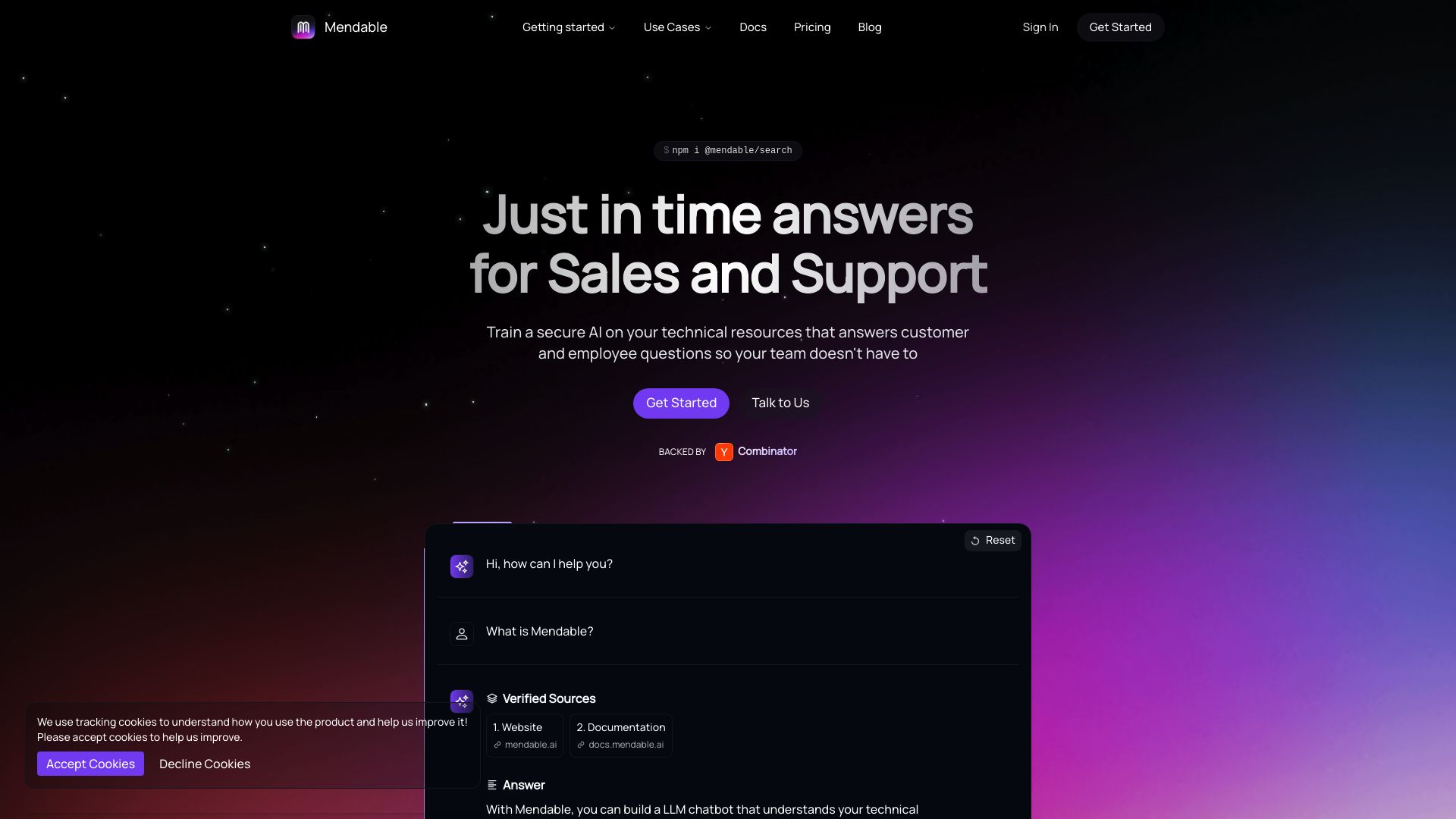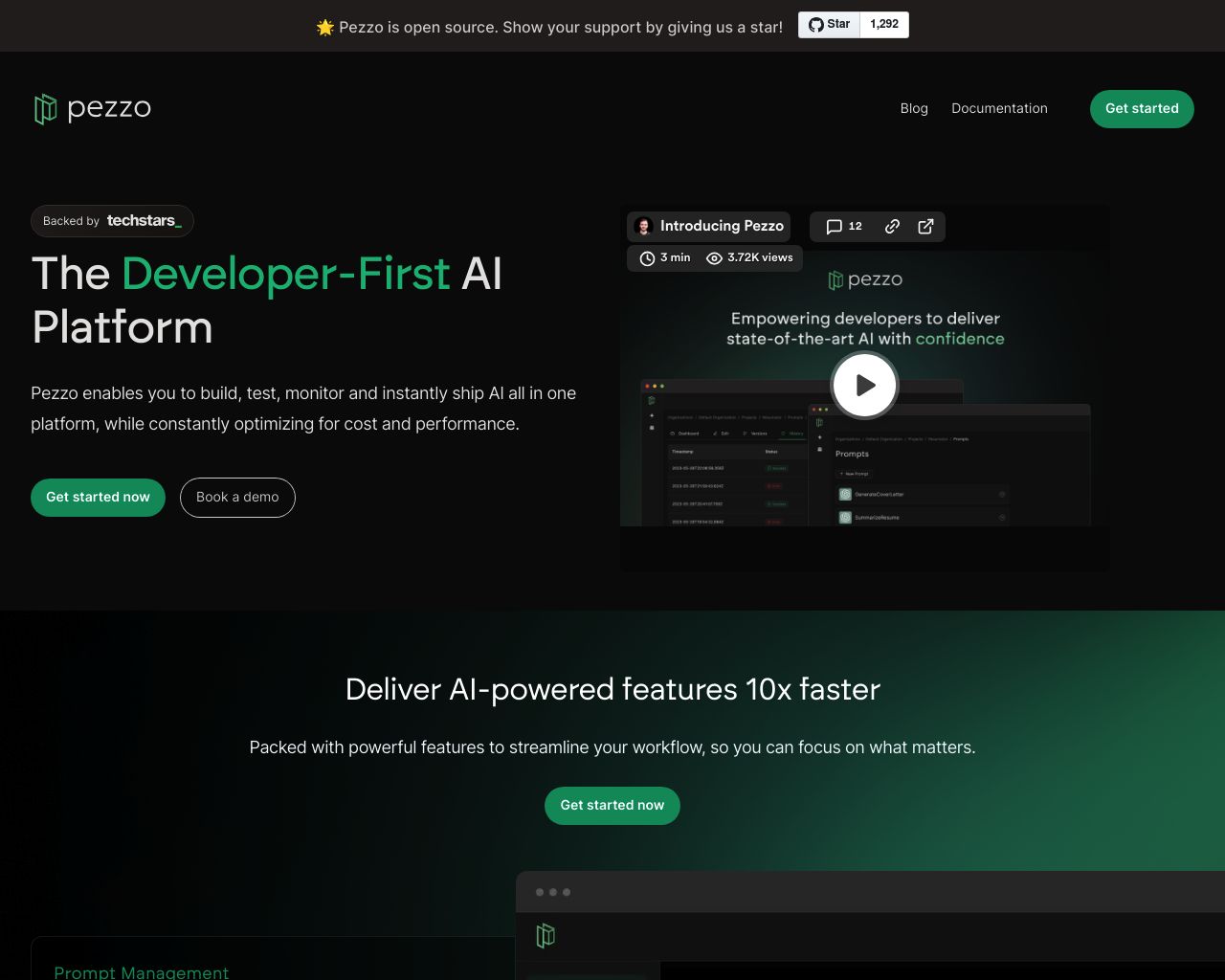Mendable vs. Pezzo: A Comparison of AI Development Tools
AI development tools transform how businesses harness advanced technology, but choosing the right platform remains a challenge. This review compares Mendable’s AI-powered search capabilities, Pezzo’s streamlined prompt management, and SmythOS’s comprehensive AI agent development environment. We explore each platform’s strengths, limitations, and unique features to help developers, business leaders, and AI enthusiasts make informed decisions. Whether you’re integrating intelligent search, optimizing prompts, or building sophisticated AI agents, this analysis provides crucial insights into how these tools can enhance your projects and workflow.
Mendable Overview
Mendable delivers AI-powered search capabilities for seamless integration into applications and websites. Their platform utilizes advanced natural language processing to provide accurate, context-aware responses based on ingested documentation.


Mendable’s core offering includes customizable chat components and APIs that enable developers to enhance their applications with intelligent search functionality. The platform excels at processing and retrieving information from various data sources, including PDFs, Word documents, and text files. This versatility makes Mendable particularly useful for businesses seeking to improve customer support, streamline information retrieval, or create more engaging user experiences.
Mendable’s core offering includes customizable chat components and APIs that enable developers to enhance their applications with intelligent search functionality.
Key features of Mendable include prompt customization, allowing users to fine-tune AI responses for specific use cases. The platform also supports auto-syncing of data sources, ensuring that the AI always works with the most up-to-date information. Mendable’s ability to filter sources based on metadata provides precise control over the information used to generate responses, enhancing accuracy and relevance.
While Mendable offers robust search and chat capabilities, it lacks some advanced features found in more comprehensive AI agent builders. The platform does not provide hosted agents for development and production environments, nor does it offer a visual builder or no-code editor for creating complex AI systems. Additionally, Mendable does not support autonomous agents or multi-agent collaboration, limiting its applicability for more sophisticated AI projects.
Mendable integrates well with popular platforms like Slack, Discord, and WordPress, extending its utility across various digital environments. The platform’s API and SDKs offer extensive customization options, allowing developers to tailor the search experience to their specific needs. However, users should note that Mendable focuses primarily on search and information retrieval rather than providing a full suite of AI agent development tools.
For businesses and developers seeking to enhance their applications with intelligent search capabilities, Mendable offers a solid solution. Its strengths lie in its ability to process and retrieve information from diverse sources, making it particularly valuable for organizations with large volumes of documentation or complex knowledge bases. However, those requiring more advanced AI agent features or autonomous decision-making capabilities may need to look elsewhere or combine Mendable with other tools to achieve their goals.
Pezzo Overview
Pezzo revolutionizes AI development with its open-source toolkit designed for efficiency and collaboration. Founded in 2023, this San Francisco-based company empowers developers and teams to harness AI’s full potential with enhanced productivity and visibility.


Pezzo’s core strength lies in streamlining prompt design, management, and publishing. Its effortless prompt and version management system accelerates AI solution delivery, a crucial feature for developers juggling multiple prompts. The platform also boosts conversions through A/B testing and experiments, while its cost optimization tools can potentially cut AI operation expenses by up to 50%.
Pezzo’s core strength lies in streamlining prompt design, management, and publishing. Its effortless prompt and version management system accelerates AI solution delivery…
Advanced features like real-time trading charts and comprehensive troubleshooting capabilities set Pezzo apart. The platform provides execution history, time-travel debugging, and test suites, enabling confident AI model deployment. Pezzo’s focus on collaboration and transparency offers detailed observability into AI operations, reducing debugging time and enhancing team understanding.
While Pezzo excels in prompt management and collaboration, it lacks some features found in more comprehensive AI agent builders. The platform doesn’t offer hosted agents, visual builders, or no-code editors. It also doesn’t support autonomous agents or multi-agent collaboration. However, its strengths in prompt management, cost optimization, and troubleshooting make it a valuable tool for teams focused on efficient AI development and deployment.
Feature Comparison
Mendable and Pezzo offer distinct approaches to AI development, with notable differences in their core components and security features. Mendable excels in providing AI-powered search capabilities, offering customizable chat components and APIs for seamless integration into applications and websites. Its strength lies in processing and retrieving information from diverse sources, including PDFs, Word documents, and text files. Mendable supports prompt customization and auto-syncing of data sources, ensuring up-to-date information for AI responses.
In contrast, Pezzo focuses on streamlining prompt design, management, and publishing for AI development. It offers an open-source toolkit that emphasizes collaboration and transparency in AI operations. Pezzo provides advanced features like real-time trading charts and comprehensive troubleshooting capabilities, including execution history and time-travel debugging. However, Pezzo lacks some of the core AI agent features that Mendable offers, such as hosted agents and visual builders.
While both platforms have their strengths, they fall short in several areas compared to more comprehensive solutions like SmythOS. Neither Mendable nor Pezzo offer hosted agents for development and production environments, visual builders, or no-code editors. They also lack support for autonomous agents and multi-agent collaboration. In terms of security, both platforms have limited features, with no mention of data encryption or OAuth implementation. SmythOS, on the other hand, provides a more robust set of features across these areas, making it a more versatile and secure choice for AI development and deployment.
Feature Comparison Table
| Mendable | Pezzo | SmythOS | |
|---|---|---|---|
| CORE FEATURES | |||
| Hosted Agents (Dev, Production) | ❌ | ❌ | ✅ |
| Environments (Dev, Production) | ❌ | ✅ | ✅ |
| Visual Builder | ❌ | ❌ | ✅ |
| No-Code Options | ❌ | ❌ | ✅ |
| Memory & Context | ✅ | ❌ | ✅ |
| Autonomous Agents | ❌ | ❌ | ✅ |
| Debug Tools | ❌ | ✅ | ✅ |
| Multimodal | ❌ | ✅ | ✅ |
| Multi-Agent Collaboration | ❌ | ✅ | ✅ |
| Work as Team | ❌ | ✅ | ✅ |
| Agent Work Scheduler | ❌ | ✅ | ✅ |
| SECURITY | |||
| Constrained Alignment | ❌ | ❌ | ✅ |
| IP Control | ❌ | ❌ | ✅ |
| COMPONENTS | |||
| Foundation AIs | ❌ | ✅ | ✅ |
| Huggingface AIs | ❌ | ✅ | ✅ |
| Zapier APIs | ❌ | ✅ | ✅ |
| Classifiers | ❌ | ✅ | ✅ |
| Logic | ❌ | ✅ | ✅ |
| Data Lakes | ❌ | ❌ | ✅ |
| DEPLOYMENT OPTIONS (EMBODIMENTS) | |||
| Deploy as Webhook | ❌ | ✅ | ✅ |
| Staging Domains | ❌ | ✅ | ✅ |
| Production Domains | ❌ | ✅ | ✅ |
| Deploy as Scheduled Agent | ❌ | ❌ | ✅ |
| Deploy as GPT | ❌ | ✅ | ✅ |
| DATA LAKE SUPPORT | |||
| Hosted Vector Database | ❌ | ❌ | ✅ |
| Sitemap Crawler | ❌ | ❌ | ✅ |
| YouTube Transcript Crawler | ❌ | ❌ | ✅ |
| URL Crawler | ❌ | ✅ | ✅ |
Best Alternative to Mendable and Pezzo
SmythOS emerges as the superior agentic AI automation platform, offering a comprehensive solution that surpasses both Mendable and Pezzo. We’ve designed SmythOS to address the limitations of existing platforms while providing unparalleled versatility and ease of use.
Our drag-and-drop interface revolutionizes AI agent creation, allowing users to build complex workflows without extensive coding knowledge. This visual approach democratizes AI development, making it accessible to a broader audience while still catering to the needs of experienced developers.
SmythOS excels in its extensive integration ecosystem, supporting a wide array of APIs, AI models, and tools. This flexibility ensures seamless incorporation into virtually any workflow or business process.
SmythOS excels in its extensive integration ecosystem, supporting a wide array of APIs, AI models, and tools. This flexibility ensures seamless incorporation into virtually any workflow or business process. Our pre-built API integrations and templates significantly reduce setup time, allowing users to focus on innovation rather than configuration.
Unlike Mendable and Pezzo, SmythOS offers robust multi-agent orchestration capabilities. This feature enables teams of AI agents to collaborate on complex tasks, enhancing efficiency and scalability in AI implementations. Our platform also provides versatile deployment options, including as APIs, webhooks, scheduled agents, and even ChatGPT plugins, ensuring AI solutions integrate seamlessly into existing systems.
SmythOS stands out with its comprehensive security features, including data encryption and OAuth support, addressing the limitations in security measures offered by Mendable and Pezzo. Our platform’s scalability, coupled with its hosted vector database and support for various data formats, positions SmythOS as the ideal choice for businesses looking to leverage AI for improved efficiency and innovation across diverse industries and applications.
Conclusion
Mendable and Pezzo offer unique approaches to AI development, each with distinct strengths. Mendable excels in AI-powered search capabilities, providing customizable chat components and APIs for seamless integration. Pezzo, on the other hand, focuses on streamlining prompt design and management, offering an open-source toolkit for efficient AI development.
While both platforms have their merits, they fall short in providing a comprehensive solution for AI agent development and deployment. This is where SmythOS stands out, offering a more robust and versatile platform for creating and managing AI agents.
SmythOS provides a drag-and-drop interface, extensive integration capabilities, and support for multiple AI models, making it accessible to both technical and non-technical users. Its ability to deploy agents across various platforms, from APIs to chatbots, offers unparalleled flexibility. Moreover, SmythOS’s focus on multi-agent collaboration and autonomous operations pushes the boundaries of what’s possible with AI.
For businesses and developers looking to harness the full potential of AI, SmythOS offers a compelling solution. Its comprehensive feature set, including hosted agents, visual builders, and advanced security measures, makes it a superior choice for those seeking to innovate and automate at scale. We invite you to explore our diverse range of AI-powered agent templates and create a free SmythOS account to experience the future of AI development firsthand.
Last updated:
Disclaimer: The information presented in this article is for general informational purposes only and is provided as is. While we strive to keep the content up-to-date and accurate, we make no representations or warranties of any kind, express or implied, about the completeness, accuracy, reliability, suitability, or availability of the information contained in this article.
Any reliance you place on such information is strictly at your own risk. We reserve the right to make additions, deletions, or modifications to the contents of this article at any time without prior notice.
In no event will we be liable for any loss or damage including without limitation, indirect or consequential loss or damage, or any loss or damage whatsoever arising from loss of data, profits, or any other loss not specified herein arising out of, or in connection with, the use of this article.
Despite our best efforts, this article may contain oversights, errors, or omissions. If you notice any inaccuracies or have concerns about the content, please report them through our content feedback form. Your input helps us maintain the quality and reliability of our information.
